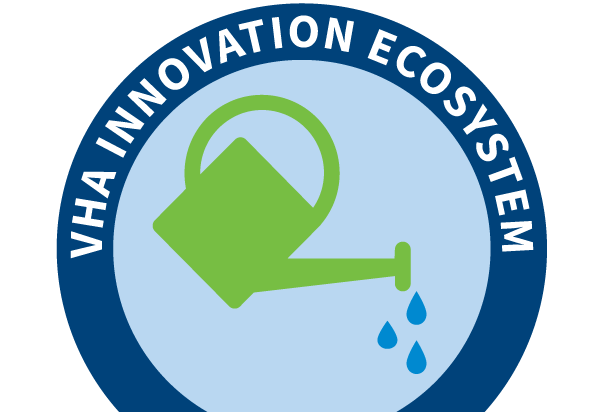The VHA Innovators Network (iNET) adheres to the fundamental mantra of “start small, fail small,” not only for its iterative design approach to innovation, but also for the number of sites (34) included in the network which receive programming and funding resources to support employee-driven innovations that work to enhance the Veteran experience. However, passionate and creative-thinking VHA employees do not reside only at these sites, so iNET continues to extend new opportunities to support all VA employees in their revolutionary journey to improve Veterans’ lives. Enter the Innovators Network Incubator Series.
In effort to weave innovation into the fabric of VA, creating a more agile and creative workforce that will better serve Veterans, iNET’s Incubator Webinar Series (Incubator) opened to all VA employees in October. Each session of the Incubator – half workshop, half panel session – leads participants through iNET’s fundamental teachings through lecture and activities before inviting frontline employees, external collaborators and experts to share their personal experience with the session’s topic area.
The fundamental trainings provided to employees are vital to laying the foundation from which VA’s maverick thinkers will innovate thoughtful solutions to improve Veteran care. The Incubator sessions supply VA staff with tools, techniques, and – most importantly – mindsets required for approaching problems from a new perspective. To make space for employees to create the future of Veteran health care from the ground-up, rather than the top-down, an organizational culture shift is vital and iNET is leading that culture change within VA.
“The Incubator is intended to guide frontline employees through the stages of innovation. Innovating is an iterative process, non-linear and often messy. This series is meant to give them the basic framework and show participants that frontline employees can innovate within our massive health care system; our panelists are real employees and leaders who are revolutionizing VA,” said Allison Amrhein, director of Operations for iNET.
Defining Healthcare Innovation
The Incubator series kicked off with “Defining Healthcare Innovation,” on October 7. Over 120 VA employees joined iNET leadership for a discussion on how to define innovation within the intersection of health care and VA. The session introduced one of iNET’s fundamental teachings – the Three Box Solution – and welcomed a panel of internal and external leaders who shared their expert insights regarding what innovation means to them, their definition of health care innovation, how they promote non-linear shifts in their organizations, and their thoughts on top-down vs. bottom-up innovation. The Three Box Solution is a framework for leading innovation that helps employee innovators recognize organizational gaps and to utilize the present moment to build the future of Veteran care. The expert panel consisted of VHA’s own Dr. Ryan Vega, chief officer for the Office of Healthcare Innovation and Learning; Oriana Beaudet, vice president of Nursing Innovation for the American Nurses Association Enterprise; and Jennifer Liebermann, senior director at Kaiser Permanente.
It starts with the problem: Intro to Human-Centered Design (HCD)
The second session of the Incubator, “It Starts with the Problem: Intro to HCD,” was hosted live from the National Press Club during VHA’s annual Innovation Experience on October 28. This interactive session focused on the importance of problem framing and started the Human Centered Design (HCD) process with a deep dive into the problem, which sets the foundation for all innovation work. The workshop offered methods to properly frame a problem, and emphasized how the problem always guides innovators to the most valuable solutions. After the 100+ attendees had the opportunity to practice framing a problem utilizing these methods, the panelists led an insightful discussion on problem framing, the importance of remaining problem focused, and the pivot that often occurs throughout the innovation process. The panel was filled with employee innovators who have done the work of HCD and spoke from first-hand experience.
Learning to Listen: Intro to Discovery
The third Incubator session, “Learning to Listen: Intro to Discovery,” wrapped-up on November 4. This session focused on the different methods that innovators use to conduct discovery work, synthesize data, and convert that information into valuable insights that inform the design process. Discovery is the process of better understanding the problem from the viewpoint of the humans most affected by it – in this case, Veterans – rather than from the designer’s outside perspective, so that solutions might be designed with the highest impact value. Showcasing one of Brene Brown’s talks on empathy, attendees also learned that empathy is a vital mindset to maintain during the discovery phase of the HCD process.
As with each session in the Incubator series, an expert panel of both VHA and external partners closed out the session with enlivened discussion surrounding the importance of empathy to better understand the problems for which solutions are being designed. This panel included a representative from the Lab at the U.S. Office of Personnel Management (OPM); Caitlin Rawlins, Innovation Specialist for Western North Carolina VA Health Care System; VHA employee innovator Debra Cole from Richmond, VA; Kevin DeMarco, CEO and co-founder of RIF Robotics; and Dr. Deana McDonagh, Industrial Design professor at University of Illinois Urbana-Champaign.
Topics in this story
More Stories
Watch the Under Secretary for Health and a panel of experts discuss VA Health Connect tele-emergency care.
The 2024 National Veteran Suicide Prevention Annual Report provides the foundation for VA’s suicide prevention programs and initiatives.
Theranostics is a specialized field of nuclear medicine that uses a two-pronged approach to diagnose and treat cancer.






